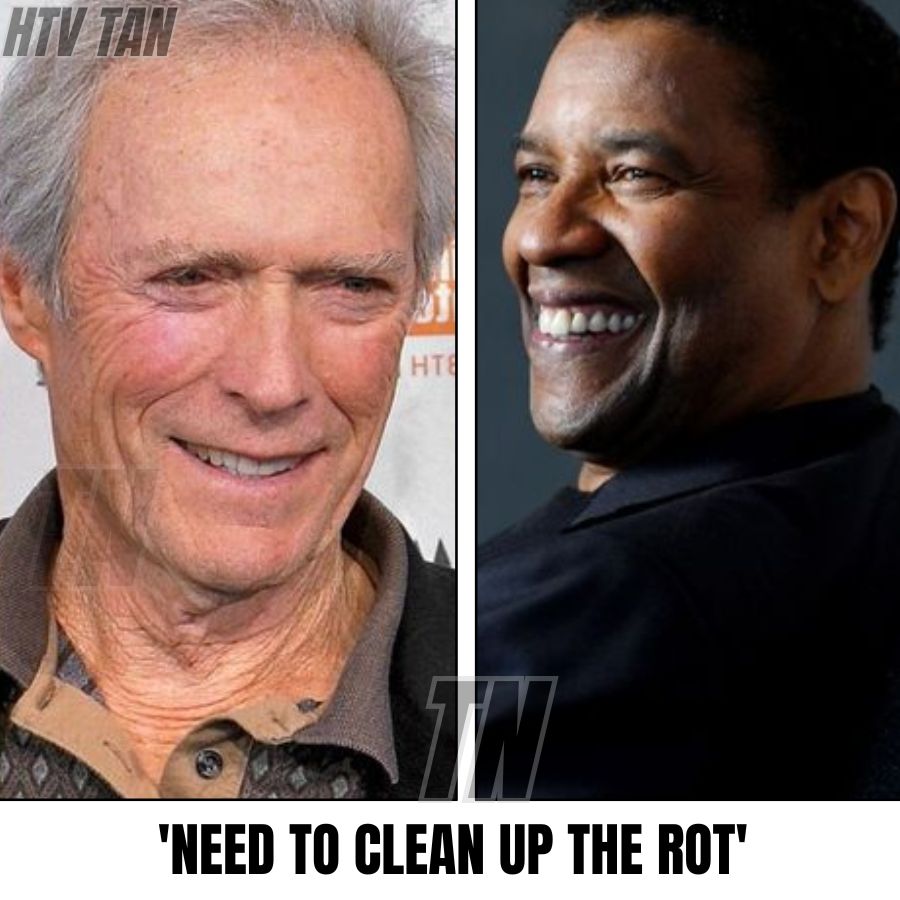Reviving Hollywood: Denzel Washington and Clint Eastwood’s Vision for a Non-Woke Film Studio
In an era where cultural and political discourse has permeated every facet of the entertainment industry, the concept of “wokeness” has become a polarizing topic. Many argue that it has stifled creativity and authenticity, leading to a homogenized and ideologically driven Hollywood. In response to this, two of the industry’s most respected and seasoned veterans, Denzel Washington and Clint Eastwood, have taken a bold step by proposing the creation of a non-woke film studio. Their vision, grounded in a desire to “clean up the rot” in the industry, aims to reclaim artistic freedom and focus on storytelling that transcends political correctness.
A Legacy of Authenticity and Excellence
Denzel Washington and Clint Eastwood are no strangers to pushing the boundaries of film. Both have enjoyed illustrious careers, not only as actors but also as directors and producers, bringing to life stories that resonate with audiences on a deeply human level. Washington, known for his powerful performances in films like Malcolm X and Training Day, has always championed narratives that explore the complexities of the human experience. Similarly, Eastwood, with his iconic roles in Westerns and his directorial achievements in films like Unforgiven and Gran Torino, has consistently delivered gritty, unflinching portrayals of characters navigating moral ambiguities.
Their combined vision for a new film studio emerges from a shared frustration with what they perceive as the current state of Hollywood. They argue that the industry’s preoccupation with “woke” narratives—those that prioritize social and political agendas over storytelling—has led to a decline in the quality and originality of films. This new studio would serve as a counterpoint, offering a platform for filmmakers who prioritize narrative depth and character development over ideological conformity.
The Critique of “Wokeness” in Hollywood
The term “woke” originally emerged as a call for awareness and action against social injustices, particularly those related to race, gender, and inequality. However, in recent years, it has been co-opted and criticized by some for fostering a culture of censorship and uniformity in creative industries. Critics argue that this shift has led to a form of self-censorship among filmmakers, where the fear of backlash or controversy stifles creative expression.
Washington and Eastwood’s critique of wokeness in Hollywood is rooted in their belief that art should challenge, provoke, and inspire, rather than conform to a prescribed set of beliefs. They contend that the current trend of prioritizing “correct” messaging over compelling storytelling has resulted in a loss of the diverse voices and perspectives that once defined Hollywood’s golden era. Their vision for a non-woke studio is to create a space where filmmakers can tell stories without the constraints of modern cultural gatekeeping.
A Return to Storytelling
At the heart of Washington and Eastwood’s proposed studio is a commitment to storytelling in its purest form. They believe that film should be a medium where diverse experiences and perspectives can be explored without the pressure to adhere to contemporary social narratives. This does not mean their studio would shy away from tackling difficult or controversial topics; rather, it would encourage filmmakers to do so in ways that prioritize character, plot, and thematic depth over didacticism.
The proposed studio also represents a return to the idea of film as an art form rather than a vehicle for social engineering. Washington and Eastwood envision a space where filmmakers can explore the full spectrum of human experience—its beauty, complexity, and contradictions—without the need to sanitize or simplify their stories to fit within the narrow confines of modern discourse.
Challenges and Potential Impact
While the idea of a non-woke film studio is appealing to many who are frustrated with the current state of Hollywood, it is not without its challenges. The film industry is deeply entrenched in the cultural and political dynamics of the day, and launching a studio that openly opposes these trends could face significant pushback. Additionally, the financial success of such a venture would largely depend on the willingness of audiences to support films that deviate from the current norm.
However, if successful, Washington and Eastwood’s studio could have a profound impact on the industry. It could inspire a new generation of filmmakers to prioritize storytelling over ideology and challenge the prevailing trends in Hollywood. Moreover, it could pave the way for a broader range of voices and perspectives to emerge in the industry, creating a more diverse and vibrant cinematic landscape.
Conclusion
Denzel Washington and Clint Eastwood’s proposal for a non-woke film studio represents a bold and potentially transformative vision for Hollywood. Their commitment to reclaiming artistic freedom and prioritizing storytelling over ideology challenges the current trajectory of the industry. While the venture faces significant obstacles, its success could signal a shift in the entertainment landscape, offering a renewed focus on the power of film to explore, challenge, and illuminate the human condition in all its complexity.










